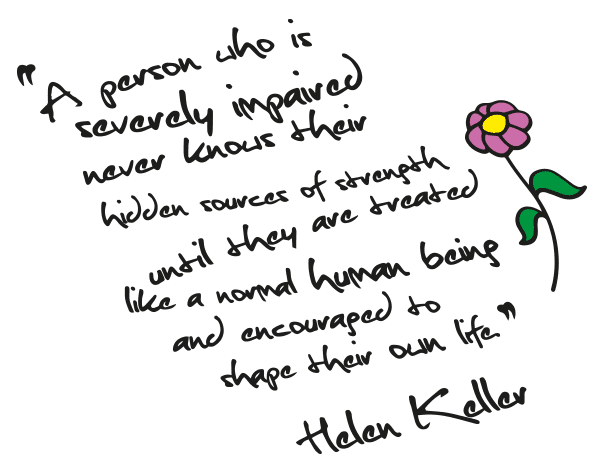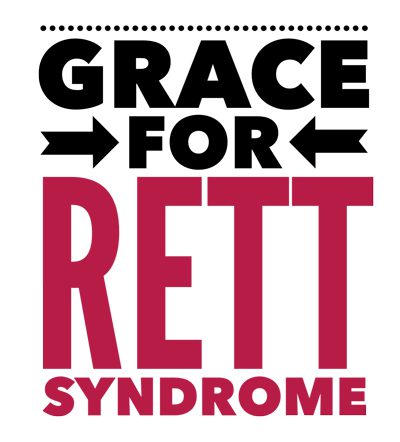Note: a week after writing this letter, Grace was approved for her eye gaze! I have no idea or proof whether the letter had anything to do with it (since no one it was really directed to even responded). But hooray! And now to get her one for home…
“A Well-articulated understanding of legal protections afforded people with disabilities, expression of love and call for compassion make for powerful advocacy. Your letter is the whole package.” -Mickie McCool
“All you are asking is that Grace be treated like any normal child and to be empowered to shape her own learning. Devices are our only tools to do that at this point. To deny the tools is to deny her the right to develop and shape her thinking and development.” -Steve Kaminsky, Ph.D (Chief Science Officer, IRSF)
 The following letter was emailed to all who were present at Grace’s recent eye gaze assessment at school. While many people on her team are on the edge of tears when Grace succeeds, others are cynical and make it clear that from Grace, they require “consistent results” (aka: doing the same thing over and over again to make sure she’s doing it on purpose). I’m posting this letter because, quite simply, it took literally hours to write. I want everyone to have access to these facts and concepts. Feel free to use it if you, too, need to send a strongly worded letter to the powers that be. We must see change. Computers are not going away.
The following letter was emailed to all who were present at Grace’s recent eye gaze assessment at school. While many people on her team are on the edge of tears when Grace succeeds, others are cynical and make it clear that from Grace, they require “consistent results” (aka: doing the same thing over and over again to make sure she’s doing it on purpose). I’m posting this letter because, quite simply, it took literally hours to write. I want everyone to have access to these facts and concepts. Feel free to use it if you, too, need to send a strongly worded letter to the powers that be. We must see change. Computers are not going away.
Grace has been given (to the tune of over £25,000):
- A special bed
- A wheelchair
- A chair for activities
- A standing frame
- A lycra body suit
- A sleep system
- A wheelchair accessible car
- A bath seat
- Orthotic aids
- Feeding tube
- Feeding pump
- Monthly deliveries of liquid feed
- An armchair
- Money for us to access respite care
- A monthly disability payment
- Nothing for communication, emotional dignity or mental wellbeing
I leave you with this…John Lasseter was fired from Disney when he suggested that computers were the future of animation. Technology is the future for our daughters. They need to have it as young as possible. It should not be a provision of the education system, but of the NHS. Girls should get it as a health care aide as young as possible, not as an educational aide once they’ve already missed a few critical years to learn to use it as their first language. If a girl had training from diagnosis, she could be fully communicative by the time they get to school (as we’ve seen happen time and time again in other countries). In America, these computers are provided by health insurance companies, not from the school system.
It’s time to demand change.
Without further ado, I give you the letter…
————————————————
“The most damaging phrase is ‘we’ve always done it this way.'” -Admiral Grace Hopper
Hi all thank you for your time yesterday. I feel so positively about Grace’s interaction with the Tobii and look forward to her future with this being made available to her.
I’m attaching a document from our friend and highly specialised SLT Sally-Ann Garrett who has been working with Rett patients for 30 years. It’s an interesting take on the concept of being ‘ready’ for high tech comm aids. I’m also CCing her in on this email incase anyone feels that her knowledge, expertise or services could be a benefit to Grace or other people in your remit with Rett syndrome. We’re very lucky that she is here in the UK and should make use of her extensive knowledge.
Susan Norwell (USA) is the most inspiring educator one could ever hope to meet. All of the Rett children in her private practice use eye gaze from even as young as 18 months. They use it as they would any language. They read and write and communicate through them. 30 years ago she had a child in her practice who was misdiagnosed as being autistic. So she taught her the same way she would any autistic child. And then they found out it was actually Rett. And so Susan just kept going, despite what was being said about this new disease (that the girls had the mental capacity of a 6 month old).
I’m sure you could tell during the meeting that I’m not thrilled with this idea of the necessity of grasping low tech before advancing to high tech. I don’t like having to always be the one with the loud voice, but Grace is worth fighting for. In my travels and relationships with many therapists, scientist, researchers and clinicians in the specialty of Rett syndrome, one thing which is clear to me is there is a lack of evidence for most of the presumptions and misconceptions that we have about Rett. One of which is that low tech mastery leads to better use of high tech. There is no evidence either way so I would be interested to know how this idea has permeated the field so heavily and why some people in Grace’s team are holding to this.
We must question the things we believe and ask ourselves ‘why’. If this ethos never existed, surely none of us would be living the lives we’re now living. We wouldn’t be driving cars or living in heated homes. We wouldn’t be communicating with computers. And disabled children would still be hidden away in institutions to rot their miserable lives away. In fact, none of your jobs would even exist if someone hadn’t asked ‘why’? Today, one person said to me “there are just these processes we have to go through.” That’s very fine and dandy when you’re building a house. But we’re not asking adults to jump through hoops. You’re asking a 5 year old to jump through hoops. A child with one of the most debilitating diseases that a kid could possibly have. Hoops that no able bodied child would be required to jump through for access to the very same thing that we’re asking for for Grace: a mouse for a computer.
Although they may seem to be the same, one thing (low tech) does not necessarily lead to or connect with the other (high tech) in the brain. They are two different processes with varying interest levels for the child using them, therefore one may seem more/less successful than the other when in fact it just isn’t. We need to shoot for heaven and if we fail, then at least Grace will land amongst the stars. This conservative, even timid, approach isn’t helping her or any child in her position. If it’s inevitable that she will be using eye gaze eventually, then she needs to have it now so she can just get on with it. Poor kid is being asked to work hard for something that should be her right, just like every other child. If nothing else, she should have the same opportunities all other kids in her school do for playing on the computer. Not rocket science…or even communication…just playing. Like everyone else.
I’m concerned with this idea that Grace has a responsibility to perform, prove herself and otherwise show ‘consistent’ results. It would seem that some people in her team are expecting more of her than they would any other 5 year old. This is not her responsibility and it’s archaic to be testing or assessing her in this manner. As I walked through the school today, I saw kids at tables playing on computers. I would be interested to know what levels they were required to consistently perform to before they were granted access to those computers. Was their IQ tested before they were allowed the miracle of a mouse to control a computer? Because this is what we’re fighting for for Grace: a computer mouse. Which she happens to have to control with the only thing on her entire body which she can control (her eyes).
As adults, it’s our responsibility to make the avenues we need to make into her mind, not the other way around. Again, this is archaic. In the words of Steve Kaminsky, “It’s not that the girls aren’t smart enough yet to show us what they know. It’s us who aren’t yet smart enough to find our way in.”
Again, I ask that you all consider being at the Rett Education conference in Birmingham on July 11th. This is the website and agenda. And this is a commercial for it. It is a once in a lifetime opportunity to receive cutting edge information about Rett syndrome and education from Susan Norwell and other groundbreaking educators who have been teaching girls with Rett for 30 years and seeing them succeed at reading, writing, maths…everything their peers are able to do. It is very important to us that everyone who is involved in Grace’s education and communication based therapies take this invitation seriously into consideration. Please let me know the result of your request to attend and we will do what we need to do in order to get anyone there who is available on that date, regardless of whether you are approved for funding to go. It’s only £100. I will gladly pay to see everyone there.
I would like to draw our attention to a few pertinent articles from the UN Conventions on the Rights of the Child (which is being taught to the children in Grace’s school):
Article 13
1. The child shall have the right to freedom of expression; this right shall include freedom to seek, receive and impart information and ideas of all kinds, regardless of frontiers, either orally, in writing or in print, in the form of art, or through any other media of the child’s choice. We are currently Grace’s voice and we are telling you that we choose eye gaze for Grace’s media.
Article 23
1. States Parties recognise that a mentally or physically disabled child should enjoy a full and decent life, in conditions which ensure dignity, promote self-reliance and facilitate the child’s active participation in the community. Grace is not currently being provided a method for this “full” life of participation.
Article 29
1. States Parties agree that the education of the child shall be directed to:
(a) The development of the child’s personality, talents and mental and physical abilities to their fullest potential. Thanks to advancing technology, low tech is no longer the fullest potential for a child. It simply is not and it’s a waste of time when we see children in America going straight into high tech as babies and soaring. Grace is not currently being provided opportunities to develop her “personality, talents and mental abilities to her fullest potential.
Article 31
1. States Parties recognise the right of the child to rest and leisure, to engage in play and recreational activities appropriate to the age of the child and to participate freely in cultural life and the arts. Simply put, all Grace’s peers get to play on computers and she doesn’t.
2. States Parties shall respect and promote the right of the child to participate fully in cultural and artistic life and shall encourage the provision of appropriate and equal opportunities for cultural, artistic,recreational and leisure activity. Grace is currently being denied equal opportunity.
Because of the advancement of technology, we must look at eye gaze not as being outside of the remit of tools to help a child realise their full potential but, rather, as being one of the things we must embrace to that end. It is not going away. We cannot fight it simply because it’s expensive. Technology simply must be our first port of call to give disabled children the provision of equal rights and opportunities which the UN convention requires.
Let’s do what needs to be done to finally get this going for Grace. She has shown consistently that on a good day, she’s fantastic at using her eyes. If we’re looking for consistency, then then let’s put that in her notes and get going. I’ve said it before, but no one gets to be on Grace’s team unless they believe in her. Unless you have hard evidence and research to suggest otherwise, I require all members of her team to ‘presume competence’.
Thank you for reading this. Go team!






